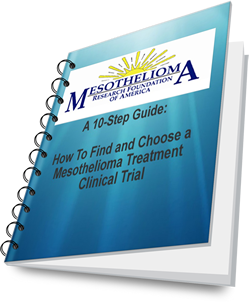CURRENT CLINICAL TRIALS
How to Find Mesothelioma Clinical Trials,
Understanding Clinical Trial Protocol,
List of All Mesothelioma Clinical Trials,
and Ask Questions of Oncologist, Dr. Parkash Gill
Support from the Mesothelioma Research Foundation of America
There is no need for you to research thousands of clinical trial listings, we do that for you and boil it all down and report only the important mesothelioma clinical trial material you need to know.
Also, for an excellent guide to finding clinical trials and how to prepare for one, see our free publication:
A 10-Step Guide: How to Find and Choose A Mesothelioma Clinical Trial
The following explains how it is done and teaches you how to do your research, but you can also do these options:
This Foundation provides listings of all Mesothelioma clinical trials recognized by the US Government, including the National Cancer Institute. The listings are available below and from our menu. When one uses the listings it is important to know and understand the workings of clinical trial protocol. The text below will also help you do that. We also provide mesothelioma support as shown:
Dr. Parkash S. Gill, M.D.
Chairman of the Foundation Medical Advisory Board
University of Southern California / Norris Comprehensive Cancer Center
1441 Eastlake Avenue, MC9172
Los Angeles, CA 90089-9172
(323) 865-3909
Fax 323-865-11060
parkashg@hsc.usc.edu
Aziz Khan, M.D. USC/Norris Comprehensive Cancer Center Los Angeles, California
Anil Tulpule, M.D. Los Angeles, California, USC/Norris Comprehensive Cancer Center
Michael Koss, M.D. University of Southern California Los Angeles, California
US Government Has Two Important Clinical Trial Sites with Thousands of Listings
How to quickly find mesothelioma clinical trials: Searching Government Databases
Mesothelioma cancer patients are often looking for clinical trials that address their medical situation. Many don’t know how to find clinical trials for mesothelioma. There are two primary government web sites that have searchable listings of clinical trails. Mesothelioma patients of course will wonder which site they should be searching. The answer is to search both sites and periodically keep a watchful eye on them to discover when any new trials are listed and recruiting.
Three (3) steps to finding Clinical Trials for Mesothelioma Cancer
Step 1: go to the primary clinical trial lists
The National Cancer Institute site at www.cancer.gov/clinicaltrials/search/ lists only cancer trials. It also lists a few other rare conditions that are in some ways similar to cancer, but for the most part you will find only cancer trials listed. These include non-treatment trials like prevention and genetics trials. Most mesothelioma patients show an interested in treatment through clinical trials. As of January 2012, there are 72 treatment trials world-wide for malignant mesothelioma cancer with 42 mesothelioma clinical trials in the United States.
The cancer.gov site can be searched by such useful categories as cancer type, cancer intervention, stage of cancer, drug used in the trial, location, as well as many other options that allow you to narrow down you search for the trial that is just right for you.
Step 2: Filter the search to find only mesothelioma cancer clinical trials
Anther major government clinical trials site is provided by the U.S. National Institutes of Health http://clinicaltrials.gov/. This web site lists trials for cancer as well as non-cancerous conditions which include glaucoma, diabetes, parasitic diseases and AIDS. As of January 2012, it lists 118,682 trials with locations in 178 countries.
A patient with mesothelioma cancer can filter a search for specific clinical trials based on condition, drug intervention, sponsor and location. There are now 190 trials listed for mesothelioma cancer using the search filter method. The list that comes up shows the status of the trial such as RECRUITING, or ACTIVE - NOT RECRUTING, or ACTIVE - NOT RECRUTING - HAS RESULTS, and finally as COMPLETED. You can also see a list of those trials first received in the last fourteen days, or those recently updated in the last thirty days. These options are helpful when you have been monitoring the clinical trials list for some time and only want to review recent changes instead of the entire list.
One can search for trials that are open or closed, and trials that already have results to report, as well as by lead sponsor, location, gender and age. You can also learn about clinical trials and how to use ClinicalTrials.gov, as well as access other consumer health information from the U.S. National Institutes of Health.
Step 3: Print the research results and consult an oncologist
After you have completed your research on the two web sites noted in steps 1 and 2 above, and made a print out of the clinical trial information that interests you, proceed to contact the director of each trial using the information that is usually given in the trial protocols portion of the research information you printed. Also, it is strongly recommended that you bring the printed list of trials to an oncologist and ask the doctor for an opionion of what trials could be right for your particular case based on the trial's eligibility criteria, phase, type and other factors.
The Mesothelioma Research Foundation of America encourages you to freely ask our staff oncologist Dr. Parkash Gill, MD about your clinical trial questions. Also, consider the clinical trials for mesotheliomo cancer that our Foundation is sponsoring.
How to Understand Clinical Trial Protocol
Our Foundation has prepared an excellent guide to finding clinical trials and how to prepare for one, and the publication is freely yours:
A 10-Step Guide: How to Find and Choose A Mesothelioma Clinical Trial
Breaking Down An Example Of A Phase III Mesothelioma Clinical Trial
Reading through the details of clinical trial protocols can be very informative for patients, even if they are not participating in a trial. It is always worth the time to review details when the National Cancer Institute (NCI) adds a new trial to its list. For this example, the trial is entitled Study of Palifosfamide-tris in Combination with Doxorubicin in Patients With Front-line Metastatic Soft Tissue Sarcoma and will be carried out in many cities through out the United States. This is a phase III trial with two different protocol ID numbers: IPM3001, NCT01168791. Protocols often have more than one ID number. Often one identification is used by the specific medical institution and the other by NCI as a tracking number.
The summary of the trial states that this is an international, randomized, double-blind, placebo-controlled trial to evaluate the clinical efficacy of palifosfamide-tris administered with doxorubicin in combination, compared with doxorubicin administered with placebo in front-line patients diagnosed with metastatic soft tissue sarcoma (STS). One unusual aspect of this trial is the use of a placebo which is pretty uncommon in cancer clinical trials but fairly common in diseases that are not life threatening. However, notice that the placebo group of patients will still be receiving treatment with doxorubicin (a well-known chemotherapy drug), they just won’t also be getting the new unproven drug. Another unusual point is that the trial is described as international although all participating institutions listed are in the United States. It may be that similar trials are being carried out in perhaps Europe with a different protocol ID number under the auspices of the European equivalent of the NCI called EORTC.
Reading the full health professional version of the trial illustrates many common points about clinical trials in general. For instance, there is a long list of patient eligibility criteria. All trials have such criteria in order to ensure a similar group of patients are in the trials. This allows the researchers to make meaningful analysis of the data. In other words, it enables them to decide if the treatment really worked or not. Criteria for this trial includes age 18 or older, a high performance status (meaning the patient is able to lead a pretty normal life and is not bed-ridden), that the patient has adequate bone marrow, liver and renal function, and also meets a number of specific blood test guidelines such as: hemoglobin ≥9.0 g/dL, absolute neutrophil count (ANC) ≥1,500/mm3, platelet count ≥100,000/mm3 and total bilirubin ≤1.5×ULN (upper limit of normal). This illustrates why it is important to get your oncologist involved if you are looking for mesothelioma clinical trials. Many of the eligibility criteria are pretty technical, so it is easier if your doctor goes through them to see if you might qualify.
There is also a list of sixteen exclusion criteria such as: any prior anthracycline (a category of chemotherapy drugs) use, known allergy to any of the study drugs, and any clinically significant concurrent medical condition that would, in the opinion of the investigator, jeopardize the safety of a patient. The trial also excludes based on particular subtypes of sarcoma such as does the patient have any one of the following sarcoma histological subtypes: alveolar soft-part sarcoma, chondrosarcoma, dermatofibrosarcoma, Ewing sarcoma, GIST, Kaposi sarcoma, and others. This is a bit unusual since most sarcoma trials include all subtypes while this one excludes based on certain subtypes.
While certain sarcoma subtypes are excluded, interestingly, mesothelioma is included in this trial. It is important to note that even though the trial does not specify mesothelioma in the title, when using the NCI clinical trial search engine, the system automatically finds any trial where mesothelioma is allowed. It also allows one to search in many different ways, for instance, allowing you to search just for new trials added in the last thirty days.
The trial information ends with the contact details both for the lead organizations running the trial and the individual sites where the trial is being run. This typically includes the investigators name, telephone number and even their email address. The date the information was listed or last updated is also found at the end of the trial listing; in the example of this case December 14, 2011.
While there are many trials listed, reading through the details of a few trials will help patients with mesothelioma cancer to get a better understanding of how trials work. They can also discover if clinical trials are a treatment approach they would be interested in trying.
List of All Mesothelioma Clinical Trials
In the year 2012 there are 72 clinical trials being run for the treatment of mesothelioma.
Source: Clinical Trials gov - List of Mesothelioma Clinical Trials in California
Source: National Cancer Institute - List of Mesothelioma Clinical Trials in California
Source: Clinical Trials gov - List of Mesothelioma Clinical Trials in All US States
Source: National Cancer Institute - List of Mesothelioma Clinical Trials in All US States
The Mesothelioma Research Foundation of America and Dr. Parkash Gill, our Chairman of the Medical Advisory Board welcome you to freely ask him about clinical trials. Currently and after several years of successful Phase II trials, our Veglin research project is waiting on FDA approval to restart the Phase II trials, and we have also submitted to the FDA our request for launching Phase III trials of Veglin. Also, Dr Gill is working diligently to get EPH-B4 into Phase I clinical trials.
ASK DR. GILL - ONCOLOGIST
Are you interested in trying a Clinical Trial?
Do you have questions related to malignant mesothelioma?
To answer these questions please use this form to send a request. Dr. Gill will make a reply by return e-mail.
Please allow some time for him to respond, depending on his schedule and the volume of questions this can take a few hours or days.
Compose your question for Dr. Gill here:
*required information



For questions related to the foundation and to make contributions please contact:
Executive Director
Toll Free:
(800) 909-Meso (6376)
3011 Townsgate Rd, Suite 450
Westlake Village, CA 91361
For more information and other questions contact:
(800) 909-6376
©2024 Mesothelioma Research Foundation Of America


